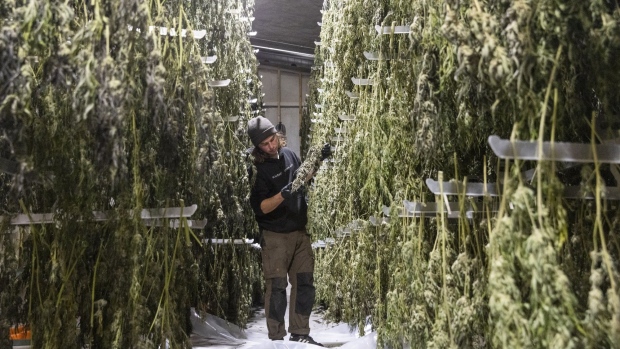Nov 21, 2022
NY’s First Legal Weed Sellers Will Be Nonprofits, People With Prior Pot Convictions
, Bloomberg News

(Bloomberg) -- New York on Monday awarded the state’s first 37 licenses to legally sell recreational marijuana to entrepreneurs with prior pot convictions and well-known nonprofits including the anti-poverty Doe Fund and an affiliate of thrift-store operator Housing Works.
The moves kick off a fully regulated and taxed pot marketplace that aims to put an end to so-called weed bodegas which have proliferated around the city in the year and a half since the state decriminalized marijuana but had yet to start sales. New York will also offer one of the US’s biggest tests of using the cannabis industry to further social-justice goals.
The regulations are the “final steps in a supply chain we’ve been building since March,” said Chris Alexander, executive director of the Office of Cannabis Management, which announced the licenses at a hearing on Monday.
The licenses went to eight nonprofit groups and 29 individuals, from more than 900 applicants. New York also approved eight new licenses for cannabis processors, giving the state a total of 32. It licensed three new testing labs, bringing the number to seven in the state, and set out rules for cannabis advertising. The licensees will be able to open as many as three dispensaries.
“It was a collective effort. It was not anything we have taken lightly in the state,” said Tremaine Wright, chairwoman of the New York State Cannabis Control Board. Speakers at the meeting, held in New York City, emphasized the state’s careful vetting of applicants for criteria that would help address the impacts of the past war on drugs.
New York officials had said that legal retail sales were supposed to start by the end of 2022, though with only a month to go, it now appears that the market won’t be truly underway on a large scale until 2023.
Prior Pot Convictions
Those given licenses to sell marijuana in the state include Housing Works Cannabis LLC, related to the nonprofit that’s known for its thrift stores around the city where proceeds go to people who are homeless or living with HIV and AIDS, as well as the Doe Fund LLC, a nonprofit that aims to break the poverty cycle for those getting out of prison by providing work, counseling and career and education opportunities.
Individuals granted licenses had to have a track record operating a small business as well as prior pot convictions. Licenses were issued to entities such as Nube NYC LLC, owned by a group including Hector Guerrero, who owned a courier and packaging-supply business. Another license went to Suzanne Furboter and Fernando Pena, who owned and operated a gastro pub and wine bar in New York.
Unlike other states that have legalized marijuana, where large publicly traded companies rushed into the market, New York reserved its first licenses for people with past criminal records related to marijuana, or their relatives. The plan was designed to address past inequities and also keep the state’s cannabis industry dominated by small businesses -- just like its liquor stores or craft beer industry.
Companies with current medical licenses in the state -- including the largest US multi-state operators, Curaleaf Holdings Inc. and Green Thumb Industries Inc. -- will only be able to cultivate 100,000 square feet of cannabis and aren’t allowed to sell recreational product until the market has been operating for three years.
The regulations were worse than anticipated for large publicly traded cannabis companies, said Cantor Fitzgerald analyst Pablo Zuanic in a research note. While it was known that the state planned to focus on small businesses, the newly disclosed rules don’t mention a previously discussed “right-to-play” fee of $20 million that could have let them participate.
Read More: New York’s Race to Invest Former Convicts in Legal Pot
Illicit Market
New York also set advertising regulations that will allow images, brands and graphics on products. Licenses for delivery of cannabis and consumption lounges weren’t yet given out, and will be issued on a later date, according to the regulator.
All businesses that win licenses to sell regulated marijuana will be held to state standards for purity and testing for contaminants outlined in a 282-page document of draft regulations released ahead of Monday’s meeting. The first to open up shops will likely get an initial boost from the state’s first wave of legal buyers and a good shot at keeping them as loyal customers.
But they will also face tough competition from an illicit market estimated to be worth more than $2 billion. Illegal shops have proliferated, many openly advertising marijuana from California or Colorado, and some selling at locations next to schools or childcare facilities -- something New York’s laws will forbid.
The state didn’t move aggressively to close them down in the hope that it could draw illicit sellers into regulated, above-ground business, though some crackdowns have occurred.
“It’s a precarious situation, because are you going to arrest Black and Brown small business owners because you think they’re selling marijuana illegally when you had the whole emphasis on social justice? It’s complicated,” said City Council member Carlina Rivera, who represents the East Village and adjacent neighborhoods.
--With assistance from Amelia Pollard.
(Updates to include some individuals getting licenses and comments from analyst.)
©2022 Bloomberg L.P.


